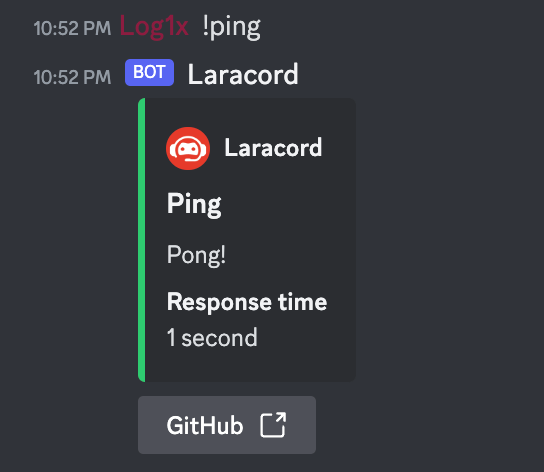Out of the box, Laracord includes a simple !ping command to test your bot with a simple response.

Creating Commands
Creating your own command is simple and can be generated using the laracord binary:
$ php laracord make:command ExampleCommand
A generated command in it's simplest form will look something like:
<?php
namespace App\Commands;
use Laracord\Commands\Command;
class Example extends Command
{
/**
* The command name.
*
* @var string
*/
protected $name = 'example';
/**
* The command description.
*
* @var string
*/
protected $description = 'The command description.';
/**
* Handle the command.
*
* @param \Discord\Parts\Channel\Message $message
* @param array $args
* @return void
*/
public function handle($message, $args)
{
return $this
->message()
->title('Example')
->content('Hello world!')
->send($message);
}
}
In the command above, the bot will send a message to the current channel with Hello world! when using the !example command.
To send the message to a user directly, you can use the ->sendTo() method on the author instead:
return $this
->message()
->title('Example')
->content('Hello world!')
->sendTo($message->author);
For a more in-depth example, check out the Examples section in the documentation sidebar.
Command Help
Out of the box, Laracord registers a default !help command which sends a message to the channel of the bot's registered commands consisting of syntax/usage and descriptions.
Hiding a command from the !help command can be done by setting the $hidden property in the command class to true:
/**
* Indicates whether the command should be displayed in the commands list.
*
* @var bool
*/
protected $hidden = true;
To opt out of using the default !help command, simply remove, Laracord\Commands\HelpCommand::class from the commands section in config/discord.php.